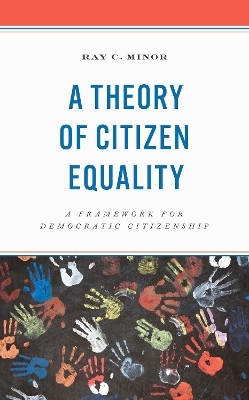
A Theory of Citizen Equality
A Framework for Democratic Citizenship
Seiten
2024
Lexington Books/Fortress Academic (Verlag)
978-1-6669-1393-4 (ISBN)
Lexington Books/Fortress Academic (Verlag)
978-1-6669-1393-4 (ISBN)
This book identifies and parses through ten domains of equality. The book explores the meta question how a state might govern itself to maximize equality for all. It provides an understanding of equality, its importance, and what is required to pursue and establish equality in a democratic state.
The aim of the book is to advance a theory of citizen equality that provides a roadmap for leveling the playing field. Citizen Equality Model is a broad theoretical approach for establishing justice and equality in a political environment. The theory prioritizes economic, political, religious, and social domains. There are ten total domains with the other six being biological, physiological, psychological, legal, educational, and leisure. If these domains are optimized, then a person has a chance for equality and the benefits of social and economic advantages. It also lists and prescribes thirteen limitations on equality. The theory approaches equality from the viewpoint of citizen as a whole person. In this sense, a citizen is met at their status and assessed to determine requirements for elevation to full equality. The goal is to place citizens in the best position to maximize their ability to attain equality.
The aim of the book is to advance a theory of citizen equality that provides a roadmap for leveling the playing field. Citizen Equality Model is a broad theoretical approach for establishing justice and equality in a political environment. The theory prioritizes economic, political, religious, and social domains. There are ten total domains with the other six being biological, physiological, psychological, legal, educational, and leisure. If these domains are optimized, then a person has a chance for equality and the benefits of social and economic advantages. It also lists and prescribes thirteen limitations on equality. The theory approaches equality from the viewpoint of citizen as a whole person. In this sense, a citizen is met at their status and assessed to determine requirements for elevation to full equality. The goal is to place citizens in the best position to maximize their ability to attain equality.
Ray C. Minor is a senior associate at the Kettering Foundation.
List of Tables
Acknowledgements
Introduction
Chapter 1: Western Political Philosophy and Democracy
Chapter 2: Equality
Chapter 3: Citizen Equality Model
Chapter 4: Economic Equality
Chapter 5: Political Equality
Chapter 6: Social Equality
Chapter 7: Religious Equality
Chapter 8: Legal Equality
Conclusion
References
Index
About the Author
| Erscheinungsdatum | 02.08.2024 |
|---|---|
| Zusatzinfo | 7 Tables |
| Sprache | englisch |
| Maße | 159 x 235 mm |
| Gewicht | 413 g |
| Themenwelt | Sozialwissenschaften ► Politik / Verwaltung ► Politische Systeme |
| Sozialwissenschaften ► Politik / Verwaltung ► Staat / Verwaltung | |
| ISBN-10 | 1-6669-1393-6 / 1666913936 |
| ISBN-13 | 978-1-6669-1393-4 / 9781666913934 |
| Zustand | Neuware |
| Haben Sie eine Frage zum Produkt? |
Mehr entdecken
aus dem Bereich
aus dem Bereich
über Alltagsorte des sozialen Zusammenhalts
Buch | Softcover (2024)
transcript (Verlag)
CHF 33,55


